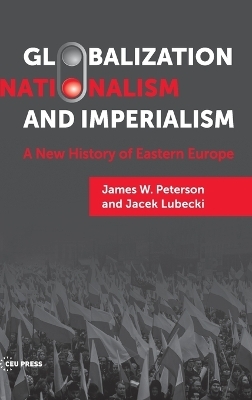
Globalization, Nationalism, and Imperialism
Central European University Press (Verlag)
978-963-386-599-6 (ISBN)
Exposed to imperial aspirations, the geographic area from the Baltic Sea to the Black Sea has in the past 150 years been subject to alternating waves of globalization and nationalism. The nineteenth century Eastern European empires were open to forces of economic globalization, but all collapsed at the end of World War One. Emerging nation-states embraced the logic of Western-led globalization but were subjugated by Nazi and Soviet empires, which pursued policies of economic autarchy. The demise of the Soviet empire marked the revival of pre-1939 nation-states and the re-entry of forces of liberalism and globalization into the region, with multiple crises of economic transition, ethnic militancy, new forms of authoritarianism, and external security threats. By 2010 negative, nationalist-populist reactions against crises that globalization brought to Eastern Europe became the dominant political trend. The analysis involves the consideration about the very contemporary factors of Brexit and COVID, as well as Russia’s and China’s influences, and their effects on Eastern Europe.
James W. Peterson is Professor Emeritus at the Department of Political Science, Valdosta State University. Jacek Lubecki is Associate Professor of Political Science at Georgia Southern University.
1. Introduction
James W. Peterson and Jacek Lubecki
Nationalism, Imperialism, and Globalization in the Shaping of Eastern Europe
Background of Theories
2. Dialectics of Globalization: Empires and Nationalism
Jacek Lubecki
Control by Empires Prior to WW I, 1815–1914
Emergence of Nation-States after 1918
Nazi/Fascist Empire, 1930s and 1940s
Communist Empire, 1945–89
Post-communist Expressions of Nationalism after 1989
3. Liberalism and Anti-Liberalism
Jacek Lubecki
The Spread of Liberalism and Its Discontentment
Successes of Liberalism and Persistence of Anti-liberalism
Conclusion: Eastern Europe between Nationalism and Globalization
4. Ethnic Challenges from Within and Without
James W. Peterson
Ethnic Warfare and Conflict within the States
Migratory Pressures from the External Environment
Theoretical Conclusion
5. Domestic and Global Security Challenges
James W. Peterson
Terrorist Threats inside the State
Russian Imperial Challenges after Crimea Takeover, 2014
Theoretical Conclusion
6. The Cloud of COVID-19 as a Global Pressure on the Region and Its Individual States, 2020 and After
James W. Peterson
Key Historical Differences
Impact of COVID-19 on Democratic Ratings
Selected Case Studies of Political and Administrative Decisions during the 2020–22 Virus
Election Outcomes during the Crisis Years
Theoretical Conclusion
7. Conclusion: Imperialism, Globalization, and Nationalism in Eastern Europe in the Twenty-First Century
James W. Peterson
Imperialism
Globalization
Nationalism
Theoretical Conclusions
Bibliography
Index
| Erscheinungsdatum | 29.07.2023 |
|---|---|
| Zusatzinfo | 6 Tables, black and white |
| Verlagsort | Budapest |
| Sprache | englisch |
| Maße | 152 x 229 mm |
| Gewicht | 408 g |
| Themenwelt | Geisteswissenschaften ► Geschichte ► Regional- / Ländergeschichte |
| Sozialwissenschaften ► Politik / Verwaltung ► Europäische / Internationale Politik | |
| Sozialwissenschaften ► Politik / Verwaltung ► Politische Systeme | |
| Sozialwissenschaften ► Politik / Verwaltung ► Politische Theorie | |
| ISBN-10 | 963-386-599-9 / 9633865999 |
| ISBN-13 | 978-963-386-599-6 / 9789633865996 |
| Zustand | Neuware |
| Haben Sie eine Frage zum Produkt? |
aus dem Bereich


